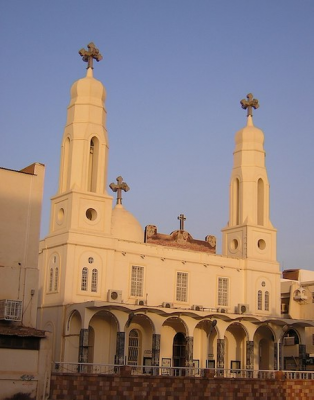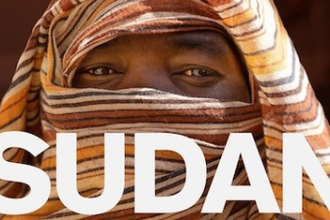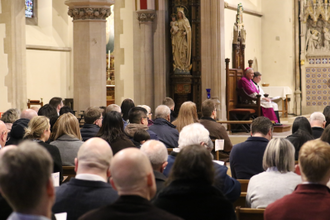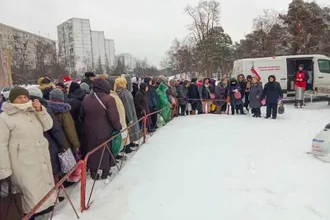Christians in peril In Sudan conflict

Occupied - Coptic Orthodox Virgin Mary Cathedral, Khartoum. Wiki Image by Adam Dohnálek
Sudan's long-suffering Christian population is under threat once more. Persecuted for decades by the former Islamist regime, Christians are fleeing the violence engulfing the African nation. The Sudanese armed forces, backed by the fundamentalist old guard, are battling the Rapid Support Forces (RSF) militia for control of the majority-Muslim nation. Neither side has popular support, and it is unlikely the rights of religious minorities will be protected if either militia is victorious.
At the time of writing, the armed forces have renewed their assault on the capital Khartoum involving the indiscriminate use of air power to bomb RSF positions in residential areas. A shell landing in the poor Mayo district on May 31st killed 30 and continues to claim lives in the absence of medical support for 100 injured civilians.
In Khartoum, the RSF has occupied and repurposed cathedrals as military bases. Archbishop Ezekial Kundo condemned the disregard for both episcopal staff and property when All Saints Cathedral was seized on May 16th. The Coptic Virgin Mary Cathedral has also been taken, as has St George's church in neighbouring Omdurman and the Roman Catholic Cathedral in El Obeid.
Christians who came to Khartoum in 2014 to escape the civil war in South Sudan are among half a million citizens who have now fled Sudan. They are joined by Christians who have lived in the capital for generations. Many head for South Sudan where refugee camps struggle to cope with the growing humanitarian disaster. Caritas is providing boats to move people along the Nile and away from overcrowded camps on the border.
As the violence has escalated in the capital, mainly Arab militias in Darfur are once more ethnically cleansing the vast western region of its Black African population. In 2003, the same militias were armed by the Khartoum regime, eliminating the non-Arab population, thereby providing Arab herders with land. One militia, the Janjaweed, became the RSF, headed by General Hemedti, an Arab Darfuri. If defeated, the RSF may retreat to Darfur, renewing their ethnic cleansing there.
Since 2003, almost a million Darfuris (out of a population of six million) have been in camps across the border in Chad. Now, thousands more are trying to reach Chad along roads where militias loot their possessions. Local reports suggest at least 2,000 non-Arabs have been killed in El Geneina, the capital of West Darfur, laying waste to the city. The RSF and Arab militias have sacked World Food Program stores, exacerbating an already desperate shortage of food.
Millions of Sudanese are without power, water, food or medicine as fighting rages around them. The majority of hospitals in Khartoum are out of service, targeted by both militias. Sexual assault and looting is commonplace, as is the kidnapping of medical staff. After several failed ceasefires brokered by the international community, the African Union is offering a roadmap to inclusive talks which activists warn will legitimize the generals. Civil society groups are suspicious of any promises made by the warring parties.
Background to the conflict
Sudan was ruled by an Islamist junta for thirty years, during which two million mainly Black African and non-Muslim Sudanese (among them hundreds of thousands of Christians) were killed in the south, and at least 400,000 non-Arab Muslims died in Darfur. A popular uprising ejected Field Marshall Omar Bashir's regime in 2019. The Sudanese armed forces agreed to transfer power to civilian rule after a transitional period, and a commission began investigating the former regime's corrupt business empire, implicating many powerful figures. The armed forces and the Rapid Support Forces overthrew the civilian administration in 2021, imprisoning those unveiling their corruption.
Civil society groups warned the international community that General Burhan of the armed forces and General Hemedti of the RSF had a track record of breaking their pledges. Both had vested commercial interests in preventing a civilian administration that would require transparency, democracy and accountability for war crimes allegedly committed by both men in Darfur.
Neither general would accept a junior role in a proposed merged army and since April 15th, they have been fighting each other with no apparent regard for civilian casualties or damage to infrastructure. Both generals will have been disappointed by the absence of popular support for their causes.
The RSF has business ties with the Russian mercenary Wagner Group, trading gold and weapons. The armed forces are historically supported by Egypt and Saudi Arabia, both wary of allowing a democratic civilian-led Arab government in the region. Activists say the RSF and armed forces have financial assets and businesses registered in Saudi and the UAE, providing potential leverage, should the international community choose to sanction them. On June 1st, the USA sanctioned several businesses connected to the generals, although the move will have little impact because of their limited commercial ties with America. Sudanese activists fear that any future negotiations involving militias will make it unlikely power shifts to a civilian government.
Rebecca Tinsley is the founder of the human rights group: www.WagingPeace.info


















